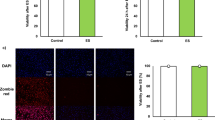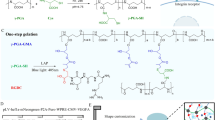Abstract
IN a recent communication to Nature, Nicol et al. 1 reported the effect of various stilbene compounds on the phagocytic activity of the reticulo-endothelial system, intimating that stimulation was associated with certain aspects in the chemical structure, and that the strongest stimulants possessed high œstrogenicity. The present communication reports the effect on reticulo-endothelial phagocytic activity of some polyphenylated aliphatic hydrocarbons related to the synthetic œstrogens of the diphenylmethane series.
This is a preview of subscription content, access via your institution
Access options
Subscribe to this journal
Receive 51 print issues and online access
$199.00 per year
only $3.90 per issue
Buy this article
- Purchase on SpringerLink
- Instant access to full article PDF
Prices may be subject to local taxes which are calculated during checkout
Similar content being viewed by others
References
Nicol, T., Bilbey, D. L. J., and Ware, C. C., Nature, 181, 1538 (1958).
Bilbey, D. L. J., Ph.D. Thesis (London, 1957).
Author information
Authors and Affiliations
Rights and permissions
About this article
Cite this article
NICOL, T., WARE, C. & BILBEY, D. Effect of Certain Polyphenylated Aliphatic Hydrocarbons on the Phagocytic Activity of the Reticulo-Endothelial System. Nature 181, 1804 (1958). https://doi.org/10.1038/1811804a0
Issue date:
DOI: https://doi.org/10.1038/1811804a0



